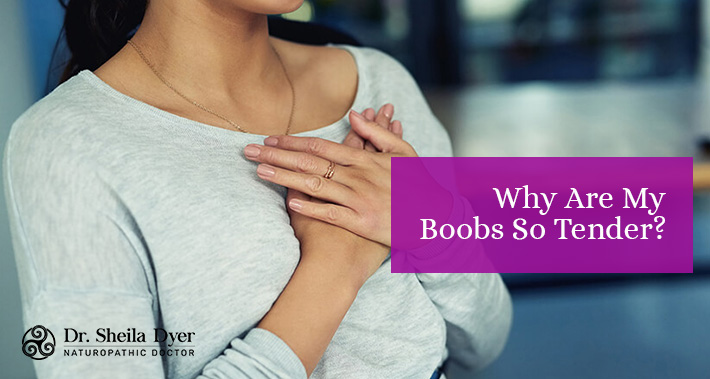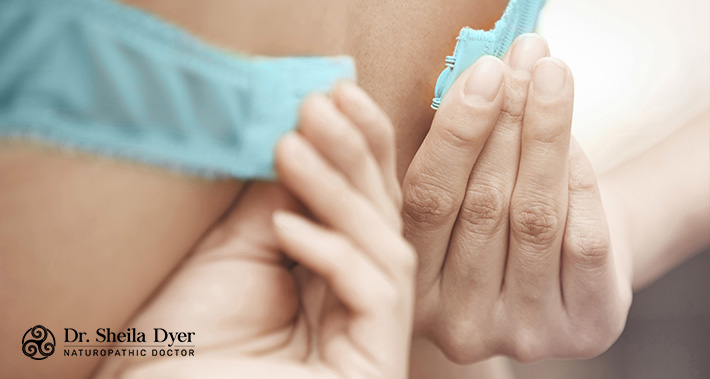Ah breasts.
If you’ve got them, you probably have a love/hate relationship with them.
And while a lot of our boob problems tend to do with their appearance, sometimes they can be achy, sore, and tender.
We’ve all heard theories about what causes breast tenderness, but before you start worrying unnecessarily, read on to see if one of these common causes is what’s making your breasts feel tender.
If you still have some concerns about your breasts, consider getting an assessment from a naturopathic doctor to see what’s causing you pain.
What’s (Probably) Not Causing Breast Pain?
The first thing that comes to mind when you have breast pain could be cancer or any number of health worries.
Most of the time, though, that isn’t the case.
Of course, it’s not impossible – according to Statistics Canada, 1 in 8 Canadian women will experience breast cancer at some point in their life.
However, far more women will have tender breasts at some point in their lives.
Before you freak out, consider some of the following points.
1. First, Check Your Bra Size
You’ve probably heard before that most people wear the wrong size bra but did you know that accounts for 80% of people who wear bras?
That’s right, according to one study, 70% of us are trying to squeeze into bras that are too small while 10% of us are wearing bras that are too large.
This, of course, can lead to a lot of aches and pains.
Aside from straps digging into shoulders and underwires pressing against your rib cage, an ill-fitting bra can cause spine pain and chest pain.
If you find yourself spilling out of your bra, dealing with straps that just won’t sit right, or feeling like your bra is a modern torture device, consider going to your nearest boutique and getting a proper fitting.
2. Next, Get A Pregnancy Test
You’ve probably heard that breast tenderness is a sign of pregnancy and in this case it’s true.
In the first five weeks of pregnancy, breasts can become swollen and tender as the body undergoes hormonal changes.
It is even possible for your nipples to stick out more.
If you think you might be pregnant, take a pregnancy test to be sure.
3. A Hormonal Imbalance
Doctors aren’t sure what exactly triggers breast pain but it seems to be related to the levels of two specific hormones – estrogen and progesterone.
There are a lot of different times when your body can experience hormonal changes, such as during puberty, your period (and also during PMS), pregnancy, breastfeeding, and menopause.
Your hormones will also be affected if you take a hormone medication such as oral contraceptives, fertility treatments, or hormone replacement therapy.
If you think that your medication may be causing breast tenderness, try talking to your doctor about alternative medications and see what other options you have.
4. Fibrocystic Breasts
Fibrocystic breasts can also be related to hormones but are very common, affecting about half of women between the ages of 20 and 50.
This happens when fibrous tissue and cysts (fluid filled sacs) form in the breasts.
Not all women with fibrocystic breasts experience pain and some common symptoms are pain, tenderness, and a lumpy or rope like texture (due to the breast tissue).
To help with the pain try using a heating pad or hot water bottle, or using a more supportive bra.
While this issue is very common, you should consult a doctor if you have a new lump, a lump that seems bigger, continues worsening in pain, or continues changing after your period ends.
5. Mastitis
Mastitis is an infection of the breast tissue.
Mastitis is most common in women who are breastfeeding but it can happen to anyone with breasts.
Symptoms include burning, swelling, warmth, redness, fever, and chills.
If you experience these symptoms, you should see your doctor for a round of antibiotics.
In the meantime, you can help your body by:
- Drinking lots of fluids
- Getting lots of rest
- Avoiding wearing bras or tight clothing
- Increase the frequency of breast feedings or express milk between feedings to reduce pain
Speaking of which…
6. Breastfeeding
Sore, dry, and chapped nipples are a common experience for mothers who are breastfeeding.
But the problems don’t stop there.
In addition to sore nipples and lactation mastitis, breastfeeding can lead to a number of issues such as engorgement, plugged milk ducts, and fungal infections.
If you’re having difficulties with breastfeeding, talk to a lactation consultant to try different approaches and latching techniques.
You may also get relief by:
- Expressing milk from your breasts between feedings
- Applying a warm compress and massaging the area around plugged milk ducts
- Rubbing your breast milk around your nipples
- Changing positions when you breastfeed
- Allowing your nipples to air dry after breastfeeding
7. Natural Fluctuation from Menstruation
If you get painful breasts during your period, it’s likely you’re experiencing cyclical breast pain because it is directly correlated with your menstrual cycle.
As your reproductive hormones estrogen and progesterone fluctuate throughout your cycle, they can also affect the size of milk glands and ducts in your breasts.
This can cause your breasts to retain water and swell, causing them to feel sore and tender.
These changes are most often felt a few days before your period starts and for some people can even affect the areas around the breasts including the upper chest, outer sides of the breasts, armpits, and even the arms.
Thankfully, these symptoms usually pass once your period ends, but in the meantime, you can combat the pain by applying ice or heat.
You can also help reduce these symptoms by:
- Limiting your caffeine intake
- Limiting your salt intake (salt contributes to water retention)
- Having a loose comfy period bra (we all have period underwear so having a period bra is the next logical step)
- Checking nutrient deficiencies with the help of your Naturopath
Book An Appointment With Dr. Sheila
Are you experiencing painful, tender, or swollen breasts?
Have you read this entire article and you’re still not feeling sure about what’s causing your breast tenderness?
If you have questions about your sore breasts and you are looking for answers,
book an appointment with me, Dr. Sheila, to find out more about Toronto naturopathic treatments for sore breasts and many other health concerns.
Together we can figure out what’s happening with your body and figure out some naturopathic solutions to get you on the road to feeling better.
If you have questions about naturopathic medicine, or would like to start with your first consultation, contact me, and let’s book an appointment.
Dr. Sheila Dyer, ND1080 Dovercourt Rd,
Toronto, ON M6H 2X8
(416) 554-5135
► https://g.page/DrSheilaDyerNd
Dr. Sheila Dyer is a Naturopathic Doctor and a practicing registered nurse offering holistic healthcare with a scientific focus

